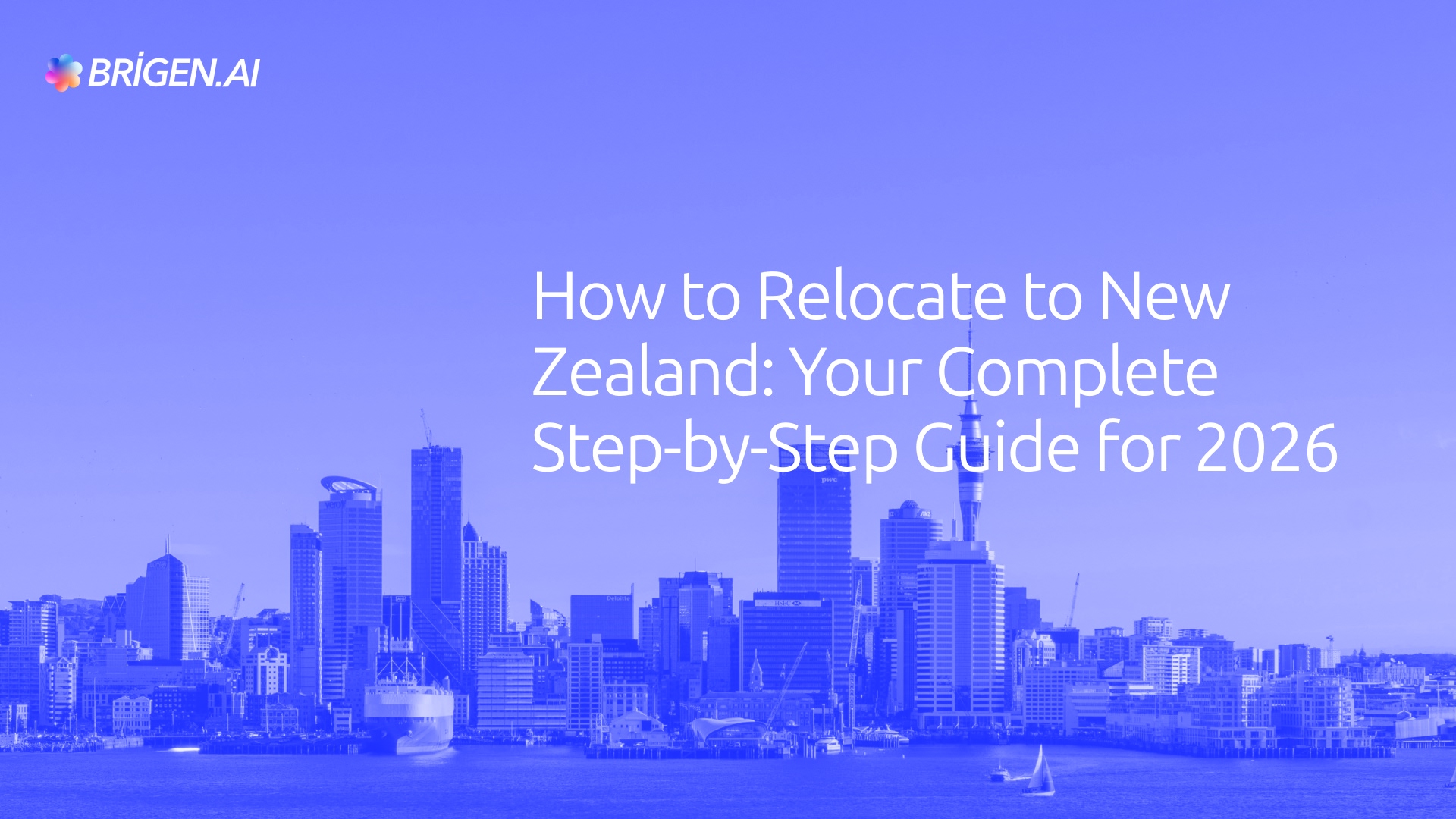How to Relocate to New Zealand: Your Complete Step-by-Step Guide for 2026

New Zealand consistently ranks among the world's most desirable places to live, offering stunning natural beauty, excellent quality of life, strong work-life balance, and welcoming communities. For professionals, students, skilled workers, and families considering moving to New Zealand, understanding the relocation process is crucial for success.
This comprehensive guide provides a step-by-step roadmap for relocating to New Zealand in 2026, covering visa pathways, practical tips, strategic career planning, and the critical role of professional guidance in navigating this life-changing journey.
Step 1: Understand Your Visa Pathways
New Zealand's immigration system offers multiple pathways depending on your circumstances, qualifications, and goals. Understanding which visa best suits your situation is the foundation of successful relocation.
Skilled Migrant Category Resident Visa (SMC)
The Skilled Migrant Category Resident Visa provides a direct pathway to permanent residence for qualified professionals with skills needed in New Zealand's economy.
Key Requirements:
- Age under 55 years
- Minimum 6 points from the points-based system
- Points awarded for occupational registration, qualifications, income, or work experience
- Job offer from an accredited employer or current skilled employment
- Meet health, character, and English language requirements
Recent Changes (Effective August 2026): New Zealand announced significant reforms to the Skilled Migrant Category, introducing two new pathways:
- Skilled Work Experience Pathway: For migrants in skilled roles (ANZSCO skill level 1-3) with at least 5 years directly relevant work experience, including 2 years in New Zealand earning at least 1.1 times the median wage (currently NZ$36.96/hour)
- Trades and Technician Pathway: For migrants in specified trades or technician roles holding a relevant Level 4+ qualification with at least 4 years post-qualification experience, including 18 months in New Zealand paid at or above median wage
These changes reduce New Zealand work experience requirements from 3 years to 2 years for most pathways, improving international competitiveness and helping retain skilled migrants.
Accredited Employer Work Visa (AEWV)
The Accredited Employer Work Visa is New Zealand's primary temporary work visa, allowing you to work for an accredited employer for up to 5 years (3 years for ANZSCO skill level 4-5 roles).
Key Requirements:
- Job offer from an accredited employer
- Minimum 30 hours per week guaranteed work
- Meet skill and qualification requirements for the role
- English language proficiency (for skill level 4-5 roles, unless exempt)
- Health and character requirements
Major 2025 Reforms: Recent reforms to the AEWV streamline the process:
- Removal of median wage requirement: Employers must now pay market rate and minimum wage (NZ$23.50/hour from April 2025) instead of mandatory median wage
- Reduced experience requirement: Minimum work experience reduced from 3 years to 2 years
- Extended visa duration: ANZSCO level 4-5 visa holders now receive 3-year visas instead of 2 years
- Interim work rights: AEWV applicants transitioning from work or eligible student visas maintain work rights while applications process
Post-Study Work Visa
International students who complete qualifications in New Zealand can apply for Post-Study Work Visas, allowing time to gain work experience and potentially transition to residence.
Duration:
- 1 year for Level 4-6 qualifications
- 2 years for Level 7-8 qualifications
- 3 years for Level 9-10 qualifications
This pathway provides valuable New Zealand work experience that contributes toward residence applications.
Working Holiday Visa
Citizens of partner countries aged 18-30 (or 18-35 for certain countries) can apply for Working Holiday Visas, valid for up to 12 months, allowing work and travel throughout New Zealand.
Green List Residence Pathway
The Green List identifies occupations with sustained shortages, offering fast-track residence pathways for qualified professionals in high-demand roles including registered nurses, ICU nurses, medical specialists, civil engineers, and various technical positions.
Step 2: Assess Your Eligibility and Strengthen Your Profile
Before applying, honestly assess your eligibility against visa requirements. Strengthening your profile increases approval likelihood and improves job prospects.
Critical Assessment Areas
Qualifications: Ensure your qualifications are recognized in New Zealand. The New Zealand Qualifications Authority (NZQA) assesses international qualifications for equivalency.
Work Experience: Document your work history comprehensively. Gather employment certificates on official letterheads showing positions held, employment periods, responsibilities, and employer contact details.
English Language: Most visas require English proficiency demonstrated through IELTS, TOEFL, or equivalent tests. Plan for testing well in advance.
Financial Stability: Demonstrate sufficient funds to support yourself (and family if applicable) during initial settlement. Current requirements vary by visa type.
Health and Character: Prepare for medical examinations and police clearances. Processing these documents takes time, so start early.
Strategic Profile Strengthening
Connect with Career Mentors: Understanding New Zealand's job market, workplace culture, and employer expectations dramatically improves your success. Career mentors in New Zealand provide insider knowledge on:
- Industry-specific insights: Understanding hiring trends, in-demand skills, and career progression pathways in your field
- Resume optimization: Adapting your CV to New Zealand standards and employer expectations
- Interview preparation: Learning Kiwi workplace communication styles and interview techniques
- Networking strategies: Building professional connections before arrival
- Cultural adaptation: Understanding workplace norms, communication styles, and professional etiquette
The platform offers AI-matched mentorship, connecting you with professionals who have direct experience in your industry and target location. This targeted matching ensures you receive relevant, actionable guidance rather than generic advice.
Step 3: Secure Employment or Job Offers
For most skilled migration pathways, employment in New Zealand significantly strengthens applications or is mandatory.
Job Search Strategies
Start Early: Begin job searching 3-6 months before intended relocation. New Zealand hiring processes can take several weeks to months.
Target Accredited Employers: For AEWV pathways, focus on accredited employers who can support work visa applications.
Adapt Your Application Materials:
- Create concise, 2-3 page CVs (New Zealand standard)
- Write targeted cover letters for each application
- Highlight transferable skills and New Zealand-relevant experience
- Include references from previous employers
Leverage Professional Networks:
- Join New Zealand professional associations in your field
- Connect with recruiters specializing in your industry
- Attend virtual industry events and webinars
- Engage with New Zealand companies on LinkedIn
Understand Market Rates: Research salary expectations using resources like Seek and Trade Me Jobs to negotiate appropriately.
The Strategic Value of Career Mentorship
Career mentors with New Zealand experience provide critical advantages:
- Hidden Job Market Access: Many positions aren't publicly advertised. Mentors can introduce you to opportunities through their networks
- Company Culture Insights: Understanding specific employers' cultures, values, and work environments helps target applications effectively
- Negotiation Guidance: Learn appropriate salary ranges, benefits packages, and negotiation approaches for your industry
- Application Feedback: Receive personalized feedback on resumes and cover letters from professionals familiar with local expectations
Step 4: Navigate the Visa Application Process with Professional Support
Immigration applications involve complex documentation, strict deadlines, and specific requirements. Mistakes can result in delays, additional costs, or refusals.
The Critical Role of Licensed Immigration Advisors
New Zealand regulates immigration advice, requiring advisors to be licensed by the Immigration Advisers Authority. Working with experienced Licensed Immigration Advisors specializing in New Zealand migration provides:
Pathway Assessment: Professional advisors assess your circumstances and recommend optimal visa pathways based on your qualifications, experience, and goals.
Application Preparation: Ensure all documentation meets Immigration New Zealand requirements, avoiding common errors that cause delays or refusals.
Document Verification: Advisors verify all supporting documents are complete, correctly formatted, and properly translated when necessary.
Submission Management: Handle submission processes, track application progress, and respond to Information New Zealand requests promptly.
Appeal Support: If applications face challenges, licensed advisors can provide representation and advocacy.
Up-to-Date Knowledge: Immigration policies change frequently. Licensed advisors maintain current knowledge of policy updates, new pathways, and processing priorities.
Application Timeline Expectations
Processing times vary significantly by visa type and individual circumstances:
- Skilled Migrant Category: Currently 6 months for 80% of applications (prioritized applications 4-7 weeks)
- Accredited Employer Work Visa: Variable based on allocation priorities
- Post-Study Work Visa: Generally 4-8 weeks
- Green List Residence: Fast-tracked processing for eligible occupations
Plan for longer timelines and ensure you maintain valid visa status throughout processing periods.
Step 5: Prepare for Practical Relocation
Beyond visas and employment, successful relocation requires practical preparation across multiple areas.
Financial Planning
Initial Settlement Funds: Budget for:
- Accommodation deposits (typically 4 weeks rent: 2 weeks bond + 2 weeks advance)
- Initial living expenses until first salary payment
- Transportation costs
- Essential household items
- Emergency fund (recommend 3 months living expenses)
Cost of Living: New Zealand living costs vary by city:
- Auckland: Highest costs, especially housing
- Wellington: Moderate to high costs
- Christchurch: More affordable than Auckland/Wellington
- Regional centers: Generally lower costs but fewer job opportunities
Accommodation
Temporary Accommodation: Book short-term accommodation for initial weeks while you search for permanent housing. Options include Airbnb, serviced apartments, or hostels.
Permanent Housing: Use Trade Me Property and Realestate.co.nz to search for rentals. Expect competitive rental markets in major cities.
Tenancy Requirements:
- Reference from previous landlords
- Proof of income
- Identification documents
- Bond payment (maximum 4 weeks rent)
Healthcare and Insurance
Public Healthcare: New Zealand residents access subsidized public healthcare through the public health system.
ACC Coverage: New Zealand's Accident Compensation Corporation (ACC) covers accident-related injuries for all residents and visitors.
Health Insurance: Consider private health insurance for faster specialist access and non-urgent treatments during initial settlement.
Banking and Financial Services
Open a New Zealand bank account early. Major banks include ANZ, ASB, BNZ, Westpac, and Kiwibank. Most require:
- Passport and visa documentation
- Proof of address in New Zealand
- IRD number (tax identification)
Driver License
If holding a current driver license from qualifying countries, you can drive in New Zealand for up to 12 months. Convert to a New Zealand license before expiration by:
- Passing theory test (for some countries)
- Passing practical driving test (for some countries)
- Providing medical certificate if required
Education (for Families)
New Zealand offers free public education for residents' children aged 5-19. Research schools in your target area and understand enrollment processes. School zones affect property choices in popular areas.
Step 6: Cultural Adaptation and Integration
Successful relocation extends beyond logistics to genuine cultural integration.
Understanding Kiwi Culture
Communication Style: New Zealanders generally value:
- Direct but polite communication
- Humility and understatement (tall poppy syndrome)
- Humor and casual workplace environments
- Egalitarian attitudes and informal hierarchies
Work-Life Balance: Strong emphasis on personal time, family, and outdoor activities. Long working hours are less common than in some other countries.
Māori Culture: Understanding and respecting New Zealand's indigenous Māori culture demonstrates cultural awareness and respect. Learn basic Te Reo Māori greetings and cultural concepts.
Building Social Networks
- Join community groups and clubs aligned with your interests
- Attend local events and festivals
- Participate in workplace social activities
- Use Meetup.com to find community groups
- Engage with multicultural associations
Career Mentorship for Cultural Navigation
Career mentors accelerate cultural adaptation by providing guidance on:
- Workplace communication norms
- Professional networking approaches
- Building credibility with colleagues
- Understanding unwritten workplace rules
- Managing cross-cultural challenges
Leveraging AI-Powered Support for Your Relocation Journey
Navigating New Zealand relocation involves coordinating multiple complex elements simultaneously—visa applications, job searches, cultural preparation, and practical logistics. Traditional approaches to finding support can be time-consuming and inefficient.
AI-Powered Matching streamlines this process by connecting you with precisely relevant professionals. Rather than spending weeks researching and contacting various advisors and mentors, intelligent matching technology analyzes your specific situation and connects you with:
- Career mentors with direct experience in your industry and target New Zealand location
- Licensed Immigration Advisors specialized in your visa pathway
Visit BRIGENAI to access AI-matched career mentors and Licensed Immigration Advisors who can provide targeted guidance for your unique relocation journey. Schedule consultations directly through the platform to accelerate your planning and maximize success.
Your Relocation Checklist
6-12 Months Before Relocation
- ☐ Research visa pathways and assess eligibility
- ☐ Connect with career mentors to understand job market
- ☐ Begin job searching and networking
- ☐ Get qualifications assessed by NZQA if necessary
- ☐ Start English language testing if required
- ☐ Consult with Licensed Immigration Advisor
3-6 Months Before Relocation
- ☐ Finalize job offer or employment arrangements
- ☐ Submit visa application with professional support
- ☐ Obtain police clearances and medical examinations
- ☐ Begin financial planning and budgeting
- ☐ Research accommodation options
1-3 Months Before Relocation
- ☐ Receive visa approval
- ☐ Book temporary accommodation
- ☐ Arrange international money transfers
- ☐ Notify current employers, landlords, utilities
- ☐ Book flights and arrange pet transportation if applicable
- ☐ Purchase comprehensive travel insurance
Upon Arrival
- ☐ Complete border procedures and activate visa
- ☐ Open New Zealand bank account
- ☐ Apply for IRD number
- ☐ Set up mobile phone service
- ☐ Register with local healthcare provider
- ☐ Begin permanent accommodation search
- ☐ Start driver license conversion process if applicable
- ☐ Enroll children in schools if applicable
Common Mistakes to Avoid
Insufficient Financial Planning: Many migrants underestimate initial settlement costs. Budget conservatively with emergency reserves.
Applying for Wrong Visa Type: Professional assessment prevents wasting time and money on unsuitable pathways.
Inadequate Documentation: Incomplete or incorrect documentation causes delays and refusals. Work with Licensed Immigration Advisors to ensure accuracy.
Neglecting Cultural Preparation: Understanding workplace culture and communication styles accelerates professional integration.
Poor Job Search Strategy: Starting job searches too late or using inappropriate application approaches reduces success rates.
Ignoring Regional Differences: Major cities offer more opportunities but higher costs. Regional areas provide different lifestyle options worth considering.
Conclusion: Your Pathway to Successful New Zealand Relocation
Relocating to New Zealand represents a significant life decision requiring strategic planning, professional guidance, and practical preparation. Success depends on understanding visa pathways, securing appropriate employment, navigating immigration processes correctly, and preparing thoroughly for cultural and practical aspects of life in New Zealand.
The journey is complex, but the rewards—quality of life, natural beauty, strong work-life balance, and welcoming communities—make the effort worthwhile for those who prepare strategically.
By leveraging professional support from career mentors experienced in New Zealand and Licensed Immigration Advisors specializing in New Zealand migration, you dramatically increase your success while avoiding costly mistakes and delays.
Your New Zealand relocation journey begins with informed planning and strategic action. The opportunities await—take the first step today.
Ready to start your New Zealand relocation journey? Connect with AI-matched career mentors and Licensed Immigration Advisors at BRIGENAI. Schedule your consultation and get personalized guidance for your unique situation.








